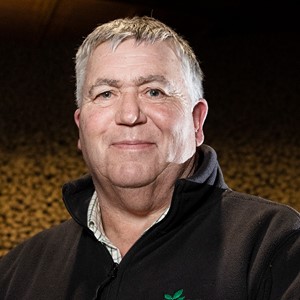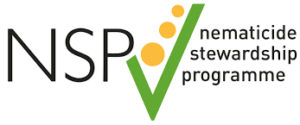Tim Rooke, potato farmer and member of the NFU potato policy group, is at the forefront of combating Potato Cyst Nematode (PCN).
Tim farms in partnership with his brother and son and has a mixture of tenanted and owned land spanning across 1,800 acres.
He’s a third-generation farmer who grows 600-650 acres of processing and crisping potatoes in Ryedale, North Yorkshire. In addition to potatoes, they grow winter wheat, winter and spring oats and oilseed rape (OSR).
In this blog, we explore the practices and strategies implemented by Tim and his family to control PCN.
What are PCN?
PCN is such a significant pest for potato crops because it causes substantial yield losses and is very persistent in the soil. This means it’s easily spread without realising.
Tim’s farm employs a robust approach to understanding and controlling the nematode population, with regular soil testing.
At least half of the 600 acres they grow on will show some signs of PCN. To understand the population, Tim tests the soil. The results inform their control and planting strategy ahead of each season.
If the land is free of PCN, they can select any variety and no control is needed. However, if there’s a population, they may need to select a variety with resistance or higher tolerance to PCN.
Managing PCN
PCN management is not just about maintaining crop health but vital for the economic viability of the farm.
Without granular nematicides, PCN can cause huge amounts of damage which can cost a lot more than buying the chemicals. Using them is key to keeping Tim’s potato farm financially healthy.
Responsible use of these products is crucial, balancing the need for effective pest control with environmental stewardship.
There’s also huge importance in using the available products judiciously and the need for building on research and development of resistant varieties. This could offer a more sustainable solution to the PCN issue in the future.
With nematicides a key part of PCN control, Tim shares how they have integrated the safe use of granular nematicides into the farm business.
Safe granular nematicide use
Tim ensures that all operators, including contractors and staff, are well trained to apply granular nematicides.
All operators hold a PA4 or PA4G certificate and are a member of the National Register of Sprayer Operators (NRoSo).
They have plenty of trained individuals who can contribute to making sure the farm is following best practice when using any chemical, including nematicides.
Calibration and cleanliness
Calibration of machinery to ensure a correct and steady flow rate is imperative. Tim explains that each year, the application equipment is assessed and calibrated by an external, independent assessor.
This is part of their Red Tractor requirements, and it’s beneficial because the external assessor can look for more subtle challenges and maintenance.
In addition, the operator calibrates the applicator every day before use, to ensure the correct rate of application.
As PCN can also multiply from relatively small numbers to damaging levels within one potato crop, making sure you pay attention to machine cleanliness at harvest time, is essential.
Tim explains that when they move from field to field with machinery, they make sure to clean off equipment to minimise the amount of contaminated soil transfer.
Safe application
Granular nematicides should be carefully controlled during application, achieving accuracy and thereby removing the risk of effects to wildlife.
They do this by applying nematicides in a single pass and ensure headlands are cultivated.
They also ensure they check fields between 12 and 24 hours after application, looking for adverse effects to wildlife, which is part of the Red Tractor standards.
Through strategic management, rigorous training and a commitment to sustainable practices, Tim Rooke’s farm stands as a testament to the effective control of PCN.
Following the NSP best practice steps will ensure that you are using the product properly as part of an IPM programme to protect your crop, the environment and consumer – find out more here.
Farm overview
1,800 acres in total
Location: Ryedale, North Yorkshire
600-650 acres for potato production – chipping and crisping
Also produces winter wheat, winter and spring oats, oilseed rape (OSR)


